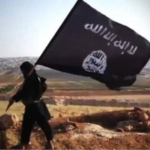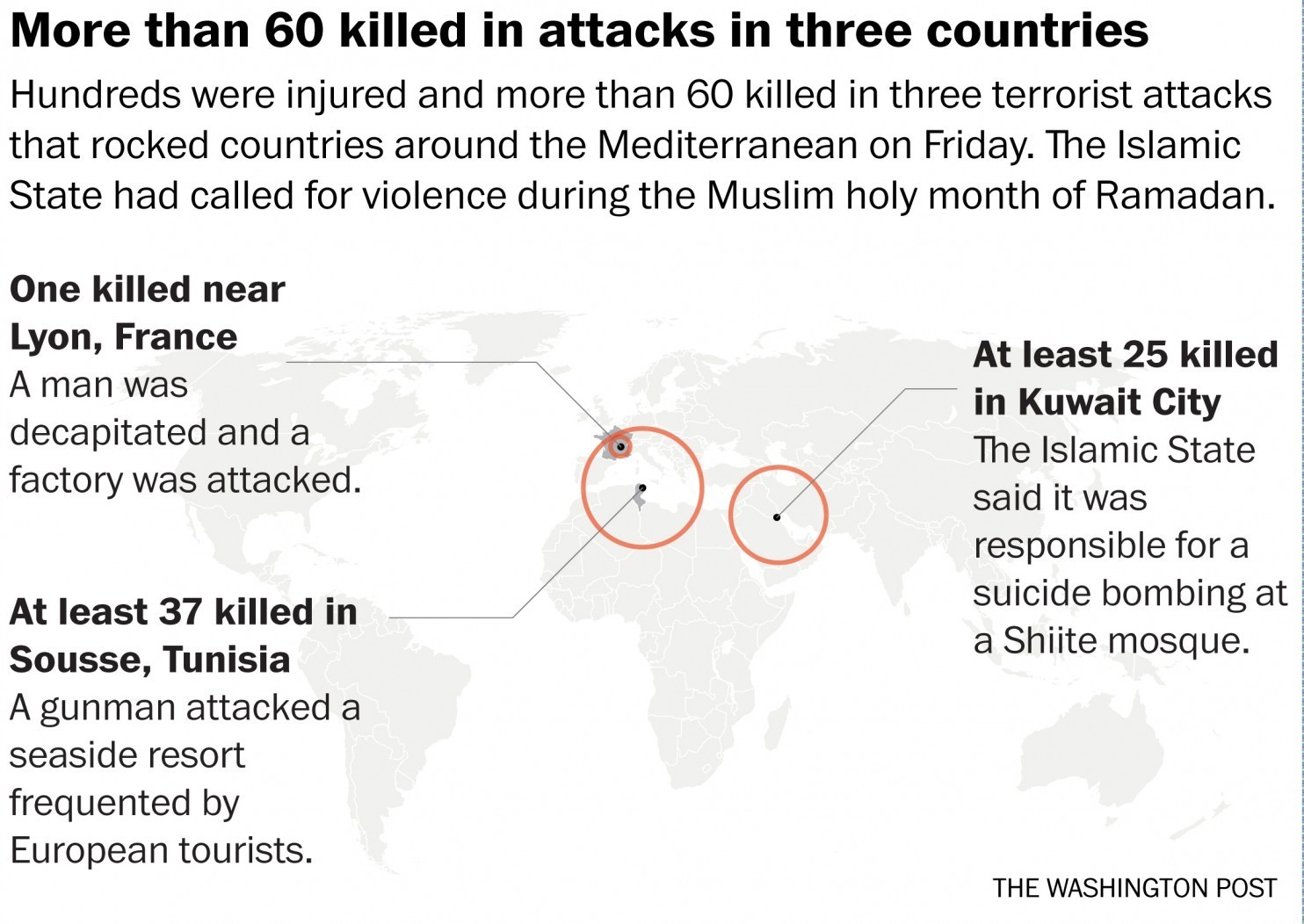Within a three hours period last Friday, jihadis killed about 60 persons and wounded several hundred others in three nation states. Friday’s attacks in France, Tunisia and Kuwait came days after the Islamic State in Iraq and Syria (ISIS) terrorist group called for such operations during the Muslim holy month of Ramadan (June 17-July 17). Was this “Bloody Friday” an introduction to more such terrorism during the next several weeks? Within what geographic limits? Within the United States? Something to consider for this Fourth of July?
What a week was last week. Just to Cherry Pick: On the one hand, there was great news from President Obama’s perspective (and terrible news for conservatives) given important Supreme Court decisions that went his way on Obamacare and gay marriage. It was horrible for all given Wednesday evening’s hate crime in which a deranged young white man killed nine black worshippers in the Emanuel African Methodist Episcopal Church in Charleston, SC. And it was punctuated on Friday by distant terrorism with ominous implications for Americans at home, especially during our upcoming July 4th weekend.
“Bloody Friday.”
I’ll briefly focus first on implications of this last concern. According to the New York Times, there were three “Bloody Friday” events, separated in space but eerily coincident in timing:
- Yassine Salhi (a deliveryman once under surveillance by French authorities for connections to radical Islamist groups) at about 1000 in the morning drove into an American-owned industrial chemical plant, decapitated one person and may have been trying to blow up the factory.
- About two hours later, a suicide bomber left the dead and wounded scattered on the carpet in one of the largest Shiite mosques in Kuwait during Friday Prayers. The assault resembled others launched by ISIS recently on Shiite mosques in neighboring Saudi Arabia, indicating that ISIS, which claimed credit for the attack, may be trying to incite a sectarian war between Sunnis and Shiites.
- About another hour later in Tunisia, at least one gunman, disguised as a vacationer, drew an assault rifle from a beach umbrella and killed at least 38 people — most of them British tourists — at a seaside resort. ISIS claimed responsibility for the attack, according to Twitter releases. The assailant gunned down victims on the beach, at the hotel pool and in the lobby before being shot to death by security forces. This was the second major terrorist attack targeting the Tunisian tourism industry in a little more than three months.
These events, coming on the heels of the ISIS Ramadan challenge through its social media network to all jihadis around the word, should give pause to our considerations for the upcoming July 4th Holiday when we celebrate our Nation’s key founding document the Declaration of Independence.
Indeed—FBI, Department of Homeland Security and Joint Counterterrorism Center authorities recently warned of potential imminent terrorism within our borders.
The obvious concern is, among other things, related to the possibility of “sleeper cells” within the United States, coupled with poorly impeded immigration of terrorists through our leaky borders. As we have previously reported, the FBI is concerned about ISIS efforts in all 50 states. And as is well known, ISIS exploits social media for communications and planning—as in its recent call for jihadi attacks during Ramadan.
So, this is not a hypothetical concern. And it is one of many serious concerns. It seems that ISIS is winning at the present time, contrary to the claims of the Obama administration.
What Deal With Iran?
Meanwhile, today is the deadline for the long promised deal with Iran that is supposed to block Iran’s steady pace toward obtaining nuclear weapons capability. As if on cue, Ayatollah Khamenei last week went back on a number of the concessions he had been alleged to make. His very public speech was accompanied with the usual “Death to America” chants in the background. Hard to miss his message.
As readers of my messages know, I am very skeptical of these negotiations—and very much believe that Israeli Prime Minister Benjamin Netanyahu has been right in calling it a bad deal—for many months. Now, a bipartisan group of American diplomats, legislators, policymakers, and experts is urging the President to delay making any deal by the end of today.
The Washington Institute for Near East Policy published their views in its June 24th “Public Statement on U.S. Policy Toward the Iran Nuclear Negotiations.” (Click here) This group notably includes former Obama senior officials: General James Cartwright, Vice Chairman of the Joint Chiefs of Staff, 2007-2011; Robert Einhorn, Special Advisor to the Secretary of State for nonproliferation and arms control, 2009-2013; Norman Eisen, U.S. Ambassador to the Czech Republic, 2011-2014; David Petraeus, Director of the Central Intelligence Agency, 2011-2012; Dennis Ross, Special Assistant to President Obama and National Security Council senior director for the central region, 2009-2011; and Gary Samore, Coordinator for arms control and weapons of mass destruction under President Obama, 2009-2013.
They argue:
“Among other things that to maximize its potential for deterring and dissuading Iran from building a nuclear weapon, the emerging nuclear agreement must – in addition to its existing provisions – provide the following:
- Monitoring and Verification: The inspectors of the International Atomic Energy Agency (the “IAEA”) charged with monitoring compliance with the agreement must have timely and effective access to any sites in Iran they need to visit in order to verify Iran’s compliance with the agreement. This must include military (including IRGC) and other sensitive facilities. Iran must not be able to deny or delay timely access to any site anywhere in the country that the inspectors need to visit in order to carry out their responsibilities.
- Possible Military Dimensions: The IAEA inspectors must be able, in a timely and effective manner, to take samples, to interview scientists and government officials, to inspect sites, and to review and copy documents as required for their investigation of Iran’s past and any ongoing nuclear weaponization activities (“Possible Military Dimensions” or “PMD”). This work needs to be accomplished before any significant sanctions relief.
- Advanced Centrifuges: The agreement must establish strict limits on advanced centrifuge R&D, testing, and deployment in the first ten years, and preclude the rapid technical upgrade and expansion of Iran’s enrichment capacity after the initial ten-year period. The goal is to push back Iran’s deployment of advanced centrifuges as long as possible, and ensure that any such deployment occurs at a measured, incremental pace consonant with a peaceful nuclear program.
- Sanctions Relief: Relief must be based on Iran’s performance of its obligations. Suspension or lifting of the most significant sanctions must not occur until the IAEA confirms that Iran has taken the key steps required to come into compliance with the agreement. Non-nuclear sanctions (such as for terrorism) must remain in effect and be vigorously enforced.
- Consequences of Violations: The agreement must include a timely and effective mechanism to re-impose sanctions automatically if Iran is found to be in violation of the agreement, including by denying or delaying IAEA access. In addition, the United States must itself articulate the serious consequences Iran will face in that event.”
“Most importantly, it is vital for the United States to affirm that it is U.S. policy to prevent Iran from producing sufficient fissile material for a nuclear weapon – or otherwise acquiring or building one – both during the agreement and after it expires. Precisely because Iran will be left as a nuclear threshold state (and has clearly preserved the option of becoming a nuclear weapon state), the United States must go on record now that it is committed to using all means necessary, including military force, to prevent this. The President should declare this to be U.S. policy and Congress should formally endorse it. In addition, Congressional review of any agreement should precede any formal action on the agreement in the United Nations.”
Bottom Lines.
I concur that these conditions are well founded, but I also believe the Obama administration is much too intent on getting a deal. Any deal. As some wise head told me when I was negotiating with the Soviets: “If you want it bad, you’ll get it bad!” Good advice, I thought then—and still.
Better to kick the can again than to sign up to an unverifiable agreement that accomplishes little for us, at best legitimizes the pathway for Iran to get nuclear weapons, and removes the sanctions on Iran—Iran’s only serious interest in these talks and our only real ability to restrain them and their export of terrorism. As we have previously observed, they are the world’s greatest exporter of terrorism—to both sides of the Sunni-Shia divide.
Furthermore, I have joined others in arguing before that we should consider that the Iranians may already have nuclear weapons—whatever is the formal view of the Intelligence Community. If so, they could use a nuclear weapon against us by simply putting one on one of their satellites launched over the South Polar regions and detonate it over the United States to create an existential electromagnetic pulse (EMP) that could kill most Americans within a year.
Michael Maloof just reported in World Net Daily that Iran is hardening its key facilities against EMP—so they well understand the EMP potential to bring down our critical infrastructure—which is largely unhardened. And as Maloof reports, Iran’s military writings indicate they well understand and include plans to do just that to bring “the Great Satan” to its knees.
Alternatively, Iran might provide one to ISIS, which is reportedly seeking nuclear weapons, to send our way via a ship that detonates it in one of our harbors—or launches it on a SCUD (They might purchase one for a few million dollars.) to create an EMP that could kill most Americans within a year.
Happy Fourth of July!
Near Term High Frontier Plans.
We will continue working with South Carolina folks to build a coalition to engage constructively with private citizens and their local and state representatives and other authorities to work with the SC National Guard in understanding and responding to the existential threats to the electric power grid. We are expanding this effort to neighboring and other states. We expect support from Cong. Jeff Duncan (R-SC) whose district includes my SC farm. He is a member of the Congressional EMP Caucus seeking legislation to counter the EMP threat.
South Carolina’s Adjutant General, Major General Robert E. Livingston, Jr. and the state’s National Guard understand and want to deal with threats to the electric grid. In future plans with him and others, I will be emphasizing efforts to assure a viable role of the nuclear power reactors that produce 60-percent of South Carolina’s electricity.
A growing number of Americans share our concerns about the lack of action on many fronts in Washington and the need for local folks to get engaged. There are growing opportunities to share High Frontier’s message both in Washington, locally and elsewhere. In July, I will be traveling to speak to conferences in New Hampshire and Louisiana and to participate in a joint US-UK conference in Washington.
What can you do?
Join us in praying for our nation, and for a rebirth of the freedom sought, achieved and passed to us by those who came before us.
Help us to spread our message to the grass roots and to encourage all “powers that be” to provide for the common defense as they are sworn to do.
Begin by passing this message to your friends and suggest they visit our webpage www.highfrontier.org, for more information. Also, please encourage your sphere of influence to sign up for our weekly e-newsletter.
Encourage them to review our past email messages, posted on www.highfrontier.org, to learn about many details related to the existential manmade and natural EMP threats and how we can protect America against them. I hope you will help us with our urgently needed efforts, which I will be discussing in future messages.
Click here to make a tax deductible gift. If you prefer to mail a check, Please send it to 500 North Washington Street, Alexandria, VA 22314.
E-Mail Message 150630
Please click here to read Past Weekly Updates!
Please help High Frontier continue this important and timely work!
Be sure to follow us on our Social Sites!
If you found this letter via our Social Sites, and you would like to subscribe, please click below!






